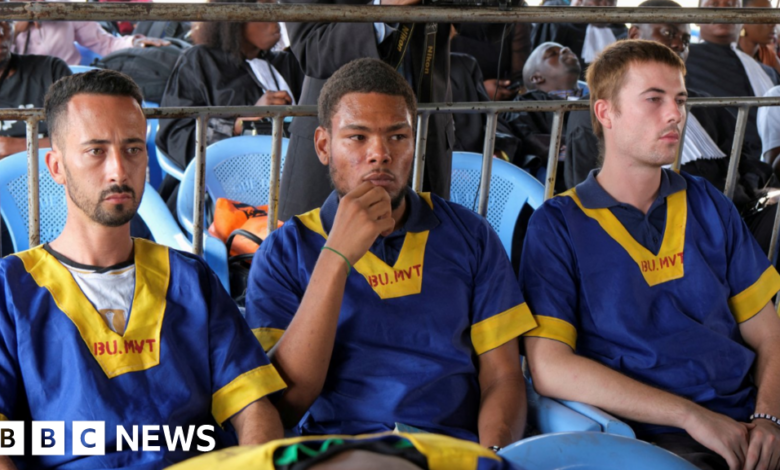DR Congo Coup Attempt: Thirty-Seven Sentenced to Death

Thirty-seven people – including three Americans, a Briton, a Belgian and a Canadian – have been sentenced to death for plotting to overthrow the president of the Democratic Republic of Congo.
The men are accused of orchestrating attacks on the presidential palace and the home of an ally of President Félix Tshisekedi in May.
Christian Malanga, a Congolese-born US citizen suspected of being the ringleader of the plot, was killed in the attack along with five others.
A total of 51 people were tried in a military court, with the trial broadcast on national radio and television.
Malanga’s son, Marcel, one of the US citizens sentenced to death, previously told the court that his father had threatened to kill him if he did not participate.
His friend, Tyler Thompson, was also sentenced to death. The pair, in their 20s, had played football together in Utah.
His stepmother, Miranda Thompson in June told the BBC family “absolutely clueless” how I ended up in the Democratic Republic of Congo.
“We were completely shocked by what was happening and the unknown. Everything we learned was what we found on Google,” she said.
The third American, Benjamin Zalman-Polun, has a business relationship with Christian Malanga.
Also sentenced to death was Jean-Jacques Wondo, a dual citizen of Congo and Belgium.
Human Rights Watch previously described him as a prominent researcher on regional politics and security, and believes that the evidence linking him to the coup plot is very flimsy..
AFP news agency reported that these British and Canadians were of Congolese origin.
The court heard that British citizen Youssouf Ezangi helped recruit a number of others to take part.
Of the 51 people tried, 14 were acquitted and released, when the court concluded they had no involvement in the attack.
Those convicted have five days to appeal the verdict.
The death penalty has not been carried out in the Democratic Republic of Congo for about two decades – instead, those convicted are given life sentences.
The government lifted the moratorium in March this year, citing the need to weed out “traitors” from the country’s dysfunctional military. However, no executions have been carried out since.
The failed coup began in the capital Kinshasa early on May 19. Armed men first attacked the home of parliamentary speaker Vital Kamerhe in Kinshasa and then advanced to the president’s official residence.
Witnesses said a group of about 20 attackers in military uniforms attacked the palace and a gunfight ensued.
A military spokesman later announced on state television that security forces had foiled “an attempted coup”.
Local media reported that the attackers were members of the New Zaire Movement linked to Malanga, an exiled politician from the Democratic Republic of Congo.
Military spokesman Brigadier General Sylavin Ekenge said Malanga was shot dead in the attack after resisting arrest.
President Tshisekedi was re-elected for a second term in a disputed election last December. He won about 78% of the vote.
The Democratic Republic of Congo is a country with abundant mineral resources and a large population. Despite this, life remains difficult for many people, with conflict, corruption and poor governance continuing.
Much of the country’s natural resources lie in the east, where violence has persisted despite Mr Tshisekedi’s efforts to resolve the situation by imposing a blockade, agreeing ceasefires and bringing in troops from neighbouring countries.
Additional reporting by Emery Makumeno in Kinshasa & Natasha Booty


